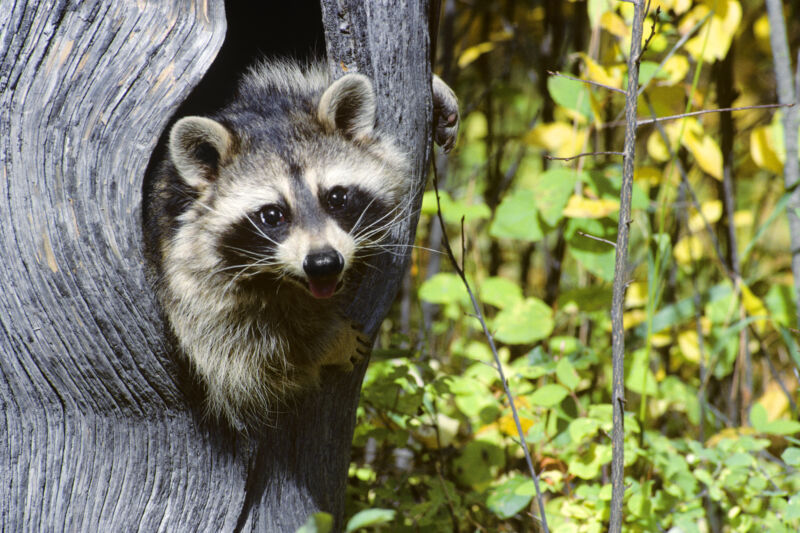

If you were looking for a reason to keep a flamethrower around the house, you may have just found one.
This week, the Los Angeles County health department reported that two people were infected with a raccoon parasite that causes severe, frequently fatal, infections of the eyes, organs, and central nervous system. Those who survive are often left with severe neurological outcomes, including blindness, paralysis, loss of coordination, seizures, cognitive impairments, and brain atrophy.
The parasitic roundworm behind the infection, called Baylisascaris procyonis, spreads via eggs in raccoons feces. Adult worms live in the intestines of the masked trash scavengers, and each female worm can produce nearly 200,000 eggs per day. Once in the environment, those eggs can remain infectious for years. They can survive drying out as well as most chemical treatments and disinfectants, including bleach.
Humans get infected if they inadvertently eat soil or other material that has become contaminated with egg-laden feces. Though infections are rare—there were 29 documented cases between 1973 and 2015—younger children and people with developmental disabilities are most at risk.
For instance, an 18-month-old boy with Downs syndrome in Illinois died from the infection after he chewed and sucked on pieces of contaminated firewood bark. An autopsy later found three worm larvae per gram of his brain tissue, with a total estimated burden of 3,027 parasitic larvae, according to a 2016 report.
Burn it down
In a news release this week, the LA health department said the risk to the general public is “low” but that the two cases are “concerning because a large number of raccoons live near people, and the infection rate in raccoons is likely high. The confirmed cases of this rare infection are an important reminder for all Los Angeles County residents to take precautions to prevent the spread of disease from animals to people, also known as zoonotic disease.”
According to the Centers for Disease Control and Prevention, one of the best prevention methods for raccoon roundworms is to kill it with fire. While chemicals stand little chance of killing off infectious eggs, extreme heat destroys them instantly.
If you have raccoons around your property, you might need to employ this method. Raccoons tend to poop in communal, pungent latrines, which are often at the base of trees, on raised surfaces—such as tree stumps, woodpiles, decks, and patios—as well as in attics and garages.
If you suspect you have an outdoor raccoon latrine on your property, the CDC recommends dousing the area in boiling water or setting it ablaze. While the CDC recommends a propane torch, specifically, a personal flamethrower could also do the trick. The agency does caution that flaming a latrine site “could cause a fire, burn injury, or surface damage.”
“Before flaming any latrine site, call your local fire department for details on local regulations and safety practices,” the CDC says. “Concrete pads, bricks, and metal shovels or garden implements can be flamed without damage. Do not attempt to flame surfaces that can melt or catch fire.”
For indoor latrines, the CDC advises not to use fire. Instead, it outlines a cautious cleaning method with hot, soapy water. However, if you want, any removed feces or contaminated material can be flamed outside, if not buried or put in the trash.